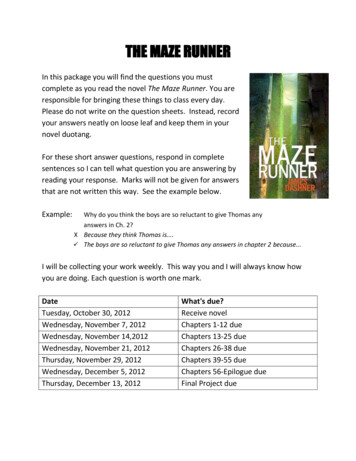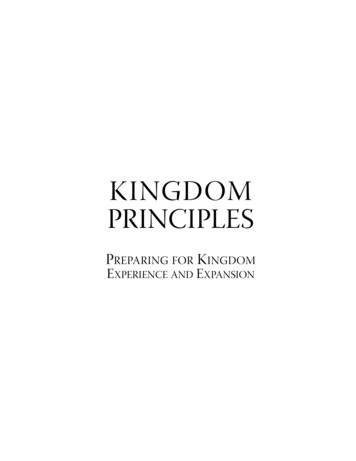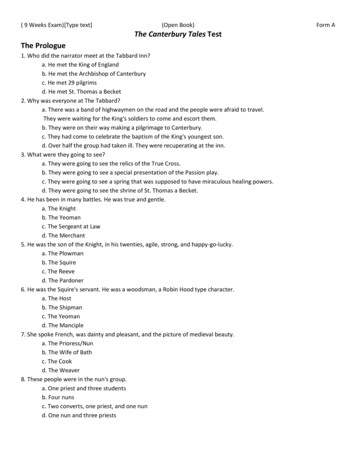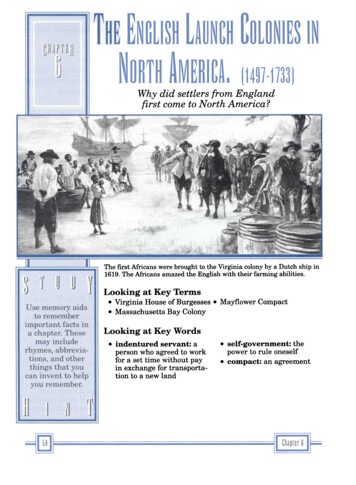
Transcription
Why did settlers from Englandfirst come to North America?The first Mricans were brought to the Virginia colony by a Dutch ship in1619. The Mricans amazed the English with their farming abilities.Lookingat Key Terms.Virginia House of Burgesses.Massachusetts Bay ColonyLookingMayflower Compactat Key Words.indenturedservant: aperson who agreed to workfor a set time without payin exchange for transportation to a new land.self-government:thepower to rule oneself.compact:an agreement
Just five years after Columbus's firstvoyage, an English ship led by JohnCabot reached North America. However,it would be another hundred yearsbefore the English began to settle in theAmericas. What took so long?England at the time was not as rich orpowerful a country as Spain. However,in 1588, the English navy smashed amuch larger Spanish fleet in a battlefought just off the coast of England.This battle ended Spain's control of theNorth AtlanticOcean. It allowedEngland to begin planting colonies inNorth America.Why was there a great conflz:ct betweendemocracy and slavery in the Southerncolonies?John White stood on the deck of hisship staring into the night. "Hello," heshouted toward shore. There was noanswer. He shouted again into thenight, but again there was no answer.Whitewas worried.Three yearsbefore, in 1587, he had founded a tinysettlement here at Roanoke (ROH-uhnohk), an island just off the coast of present-day North Carolina.Soon, thesettlement ran low on food. White wasforced to sail back to England to getmore food. Then England went to war,and he was not able to return. Now hehad come back, but there was no one togreet him.Vanished without a traceWhitetried not to show his concern. The nextmorning,he and his men rowed toshore. Something was clearly wrong.The settlement was abandoned. Houseswere empty. What had happened? Theonly clues were carvings on two trees"CRO" on one tree and "CROATOAN'on the other. Croatoan was the name ofan island to the south. apter White wanted to find the island rightaway, but a storm blew up. One ship wasleaking badly, and the crew refused tosail. White took the other ship, but theycould not find Croatoan island. Theywere forced to return to England. Noother sign of the colonywas ever found.To this day, no one knows whatbecame of the "lost colony" of Roanoke.Were the settlers killed? Did theystarve to death? Their fate is still amystery. It was an unlucky start for theEnglish in North America.JamestownIn 1606, a group ofEnglish merchants received permissionfrom King James I to set up a colony inNorth America. These merchants hopedto find riches to rival the Aztec empirein Mexico.In December 1606, three ships carrying about 100 men and boys sailed for apart of North Americathey calledVirginia.The settlers arrived at themouth of the Chesapeake Bay in April1607. They traveled 60 miles (96 kilometers) upstream and began to build avillage. They named it Jamestown inhonor of King James I.The settlers of Jamestown faced hardtimes. The village was built on swampyland that spread disease. Half the settlers were nobles who were not interested in planting crops. They only wantedto search for gold. They found no gold,and soon all their supplies were gone.Many of them died from starvation orsickness. By spring, one half of the settlers were dead.Then Captain John Smith took overas leader. Smith was tough. He told thesettlers they would have to work or gohungry. Things improved briefly. Butthen Smith hurt his leg badly and hadto return to England.With Smith gone, things again beganto fall apart. The winter of 1609-1610was so terrible that the settlers called it 1
"the starving time." Before the starvingtime, there were 500 people in Jamestown.When it ended, only 60 settlers were alive.RaisingtobaccoConditionsimproved when a strict new governortook over. Soon, new settlers and supplies arrived from England. Then thebig breakthrough came. John Rolfe discovered that tobacco could grow well inthe Virginia soil. Tobacco had long beengrown by Native Americans. Mter theSpanish conquest, it was introduced toEurope. Tobacco shipped to Englandmade money for the settlers.Soontobacco was Jamestown's main crop.The beginningof slaveryAsJamestown grew, farmers needed moreworkers to grow tobacco. At first, theseworkers were indenturedservants.Indentured servants were men andwomen who agreed to work for free for aset number of years. In return, theyreceived a free trip to the colonies.There weren't enough indentured servants to do all the work. The NativeAmericans refused to work for the settlers. In 1619, a Dutch ship brought 20Africans to Virginia.These firstAfricans in the English colonies wereindentured servants. Mricans who cameafter them, however, were brought asslaves. Slavery would become an important part of life in the Southern coloniesin the years ahead.Self-governmentSettlers heldslaves, but they wanted more freedomfor themselves. In 1619, the new governor of Virginia allowed the settlers tohave some self-government.Self government is the power to rule oneself. Thegovernor formed the Virginia House ofBurgesses. This group was made up ofEnglish settlers elected by free whiteJohn Smith, at the center of this picture, had a big problem. He was the leader ofJamestown. Yet many people in his colony would rather hunt for gold than makepermanent houses or plant crops. How did Smith handle this problem?-
1587Colonists settleon RoanokeIsland and thendisappear.II1497John Cabot landsin North America,claiming it forEngland.1619TheVirginiaHouse ofBurgessesis set up.1635Roger Williamsarrives inRhode Island.1620The Pilgrimsland inMassachusetts.1607Jamestownis settled inVirginia.1675Native Americans rise upagainst the colonists in"King Philip's War."1630s-1640sThe Great Migration bringsthousands of Puritans toM assach usetts.READING A TIMELINE Note "King Philip's War" in 1675. Now look at thetimeline on page44. What similar eventhappenedto the Spanishabout the sametime?males in each town. This was an important first step toward self-government.This first step toward self-governmentand the introduction of slavery happenedin the same year, 1619. Freedom andslavery were two ideas that could notexist together. For the next 250 years,Americans would try to deal with theconflict between freedom and slavery.Why did the Pilgrims and the Puritanscometo live in New England?Other English settlers were not like thesettlers of Jamestown. The Pilgrims came a ter to America for religious freedom. Theywere simple, religious people who wereused to hard work. In the 1600s,Englanddid not have religious freedom. ThePilgrims were forced to leave Englandbecausethey refused to follow the Churchof England. In 1620, the Pilgrims weregiven permission to settle in Virginia.They sailed on a tiny ship, theMayflower, on September 16, 1620. Astorm blew the Mayflower north. Insteadof landing in Virginia, they landed off thecoast of present-dayMassachusetts.The MayflowerCompactBeforeleaving their ship, Pilgrim men signedan agreement to obey whatever lawstheir officers made. In the MayflowerCompact, Pilgrim men agreed to electleaders and obey the laws that the leaders made. A compact is an agreement.Like the Virginia House of Burgesses,this compact was an importantsteptoward democracy.aJ
This famous painting show Puritans going to church on a snowy Sunday morning.The Puritans had a very strong faith in "pure" religion. This got them into troublewith the king of England. It led them to come to North America.Help from SquantoThe Pilgrimsbuilt a sturdy settlement on a spot theycalled Plymouth (PLIHM-uhth).Still,they faced many problems. The winterwas cold, and they had little food. Almosthalf of the people who had made the tripon the Mayflower died before spring.Others were too sick to do any work.Then one March morninga tallNative American walked into the village. His name was Samoset. He surprised the colonists by speaking to themin English. He said he wanted to helpthe Pilgrims.A few days later, hereturnedwith a NativeAmericannamedSquanto(SKWAHN-toh).Squanto told the Pilgrimshe hadlearned Englishwhen he was kidnapped by an English sea captain.Squanto shared his food with the starving Pilgrims.He also taught themNative American ways of growing corn,hunting for animals, and fishing.With the help of Squanto and otherNative Americans, the Pilgrims began tothrive. In the fall, they asked Squantoand about 90 other Native Americans toa feast. That first "Thanksgiving" wasthe start of the holiday that is held everyyear at the end of November.MassachusettsBayMeanwhile, asecond English settlement was beingbuilt near Plymouth. It was called theMassachusettsBay Colony.Thiscolony was founded by people who calledthemselves "Puritans." They took thisname because they wanted to "purify"the Church of England. When the kingpunishedthem for criticizingthechurch, the Puritans decided to go toNorth America. There they set up a religious colony based on their beliefs.Salem, the Puritan's first town, wasfounded in 1628. Boston was begun in1630.ManyPuritanscametoMassachusetts during the 1630s and1640s. By 1643, there were 16,000 people living in the colony.The Puritans believed strongly in education. In 1647, the Puritans passed oneof the most important laws in Americanhistory. Towns with more than 50 familieshad to set up a school that was paid for bytaxes. This was the beginning of the public school system in the United States.
The Puritans also believed strongly indeD1ocracy. In a deD1ocracy, people arefree to govern theD1selves. However, thePuritans did not believe in religiousfreedoD1. All people who lived in theirsettleD1ents had to follow Puritan rules.People who did not follow the rules werepunished or driven out of the colony.The foundingof RhodeIslandOne young minister who disagreed withthe Puritanswas Roger Williams.Williams felt that all people should beable to worship in their own way. He alsodisagreed with the Puritans' harsh treatment of NativeAmericans.WhenWilliams spoke out against Puritan leaders, they drove him out of the colony.Williams fled south with his followersin 1635. He made friends with the localNative Americans and decided to start asettlement. He called the settlementProvidence. Providence was the firstAmerican town to guarantee religiousfreedom to all its people.A few years later, Williams was joinedby Anne Hutchinson. She had also beendriven out of Massachusetts for her religious beliefs. Hutchinson and Williamsfounded a new colony called RhodeIsland. Rhode Island welcomed colonistsof every religion.How did the New England coloniesgrowfrom roots in Massachusetts?Other groups of colonistsleftMassachusetts to found new colonies.Some left to find religious freedom.Others left to find more or better land.A group followed Thomas Hooker southinto the valley of the Connecticut River.Settlers later joined together to formthe Connecticut colony. Another groupheadednorthandsettledNewHampshire. Others pushed into present-day Maine where they fished andcarried on a busy trade. By 1650, settlers were pushing out allovertheregion they called "New England."Wars with NativeAmericansWherever the colonists went, they foundNative Americans already living there.A few of these Native AmericansReading a Chart. When did the great growth ofthe African American population in the South firstbegin?Why did growth fall behind in the North?
became Christians. However, most didnot want to convert. They found themselves being pushed off their land. AsNew England grew, so did tensions.In 1675, the Native American leaderMetacom (MEH-tuh-kahm) launched awar to regain lost lands. Metacom,called King Philip by the settlers, unitedmany Native American groups to fightagainst the settlers. The war, which theycalled King Philip's War, lasted threeyears. Both sides slaughtered their enemies. In the end, Metacom was defeatedand killed. Thousands of other NativeAmericans were also killed. Many whosurvived were pushed west or north intoCanada. Native Americans would nolonger block the growth of the NewEngland colonies.By 1700, there were four Britishcolonies in New England. They wereMassachusetts, Connecticut, RhodeIsland, and New Hampshire. Maine waspart of Massachusetts. Vermont waspart of New York.The growth of democracyAllover New England, settlers were tryingto tame their environment. They set uptowns, built churches, and openedshops. They grew crops in the rockysoil. By the early 1700s, New Englandwas the center of shipbuilding andtrade in the British colonies. NewEngland boats reached ports alloverthe world. Foreign goods were unloadedon docks in Boston, Providence, andother towns.Democracy took root in the NewEngland colonies. Each New Englandtown held regular meetings. Adultwhite men who held property in thetowns were allowed to vote on townissues. These town meetings are stillheld in some New England towns today.When the time came for independencefor the colonies, New England wouldbe ready.
How were the Middle and Southern coloniesdifferent from the New England Colonies?An old engravingshowsthe first womensettlers landing in Jamestown.Forwomen from London'sslums,life on the American frontier was a test of courage.Lookingat Key Terms.Middle Colonies.Act of TolerationLookingSouthern Colonies.at Key Words.synagogues:Jewishplaces of worship.toleration:allowing otherpeople to practice their ownbeliefs and customs.debt: money that peopleowe.debtors:people who cannot pay their bills.jIEI J3Quakers.cash crops: crops raisedfor sale rather than for afarmer's personal use.indigo:a plant that can bemade into a blue dye.spirituals:religious songsdeveloped by enslavedMrican AmericansF
When a colonist from Maryland visited the colony of New York in 1744, hewas surprised at how few people couldspeak English. "I heard nothing butDutch spoken all the way," he complained. A few years later, BenjaminFranklin wrote how English-speakingand German-speakingcolonistsinPennsylvaniadid not communicatewell: "Few of the English settlers understand the German language. The twogroups do not talk to each other."The people who lived in the Britishcolonies south of New England werevery diverse. Their diversity affectedthe way they lived. Sometimes,itcaused problems.People ometo the Mi le oloniesfrom MI ver Europe. y did peoplefrom different countries inEuropecometo the English colonies?By 1733, there were 13 Englishcolonies in North America. Only four ofthem were in New England. The restwere located south of New England intwo regions, the Middle Colonies andthe Southern Colonies.The Middle Colonies were New York,Pennsylvania,Delaware, and NewJersey. The Middle Colonies had amilder climate than the New EnglandColonies. The soil was also more fertile.The Dutch in New NetherlandsIn 1623, three years after the Pilgrimsarrived, Dutch traders built a fort alongthe Hudson River. They called it FortOrange. The next year, the Dutch settled New Amsterdam at the southerntip of Manhattan Island. The Dutchbought the island from the local NativeAmericans for a few dollars in trinkets.The Dutch called their colony NewNetherlandsafter their homeland. apler1Other people were welcome to settle inNew Netherlands. In 1654, 23 DutchJews came to live in New Amsterdam.They were the first Jewish people tosettle in North America. Other Jewswould come to Rhode Island and othercolonies and build places of worshipcalled synagogues.Settlers from SwedenIn 1638, asmall group of colonists from Swedensettled in present-day Delaware andsouthern New Jersey. They called theircolony New Sweden. The Swedes builtthe first log cabins in North America.Many settlers who came after themcopied these homes. The Swedes werefew in number, and their colony wassoon taken over by the Dutch.The Dutch, however, would not stayin power much longer. In 1664, Englishwarships easily seized New Amsterdam.The invasion was led by the Duke ofYork. After his victory, the dukerenamed the colony New York. FortOrange became Albany. Many Dutchpeople stayed on in New York, despitethe new rulers.The Duke of York then gave part ofthe land to two nobles who were hisfriends. The land was a reward for theirloyalty and support. This land becametoday's state of New Jersey.William PennIn 1681 and 1682,William Penn received grants of landfrom the English king. These lands nowmake up the states of Pennsylvania andDelaware. Penn came from a wealthyfamily. As a young man, he joined a religious group in Englandcalled theQuakers (KWAYK-uhrz). The Quakersbelieved in living simply and at peacewith all peoples.Penn set up the colony of Pennsylvaniain 1681. Pennsylvania means "Penn'sWoods" in Latin. He paid the Delaware, aNative American nation, for their land
and treated them fairly. Penn made apeace treaty with the Delaware that hekept for his lifetime. He enjoyed visitingthem and joined in their sports. They saidthat Pennran and jumped like a warnor.Penn believed in toleration (tahl-uhray-shuhn). He allowed people to practice different religions in Pennsylvania.Many new settlers came to Pennsylvaniafrom Germany and Switzerland. Theybecame successful farmers and builttheir own thriving villages.In 1688, a German Quaker group issuedthe first protest against slavery in NorthAmerica: "Negroes are brought hereagainst their will. Don't these poor peoplehave as much right to fight for their freedom as you have to keep them as slaves?"The protest did no good. Still, Mricansin Pennsylvania managed gradually towin more rights than Mricans in othercolonies. By the middle of the 1700s,Pennsylvania had more free Africansthan any other colony.These people andtheir descendants would lead the movement against slavery in the 1800s. ther ettlers orne to the outhern olonies.'\iVhatcoloniesdevelopedin theSouth?The four Southern Colonies wereMaryland, Virginia,Carolina, andGeorgia. They were settled mostly bypeople from England. You read aboutthe founding of Virginia in Chapter 6.William Penn signs a treaty with the Delaware in 1681. Penn paid for the land heused to start the colony of Pennsylvania. Throughout his life, he treated NativeAmericans fairly. After his death, things changed. bhapter1
1634Maryland issettled underleadership oford Baltimore.1624Dutch tradersbuy ManhattanIllsland fromNativeAmericans.101649MarylandpassesAct ofToleration.1638Swedishsettlersarrive inpresent-dayDelawareand NewJersey.1664The English take overthe New Netherlandsfrom the Dutch,renaming it New York.1660!Virginia lawsays Africanslaves areslaves for life.1733James Oglethorpefounds Georgia.1681William Penn founds thecolony of Pennsylvania.READINGA TIMELINE Whicheventsonthe timelinehappenedin the17thcentury?Whicheventsshowthe Englishempiregrowingbigger?Marylandwas founded by LordBaltimore, a friend of the English king.Lord Baltimore was Catholic in a country that persecuted many Catholics. Hewanted to set up a colony whereCatholics could practice their religionfreely. In 1649, Maryland passed an Actof Toleration.It provided religiousfreedom for all Christians.Carolina and GeorgiaEight richfriends of King Charles II founded thecolony of Carolina in 1663. The land wasgood for growing tobacco, rice, and cotton. The settlers built large plantations.In 1712, Carolina split into two newcolonies, North and South Carolina.North Carolina had a more varied economy. It also had a larger number ofsmall farms. South Carolina had mainlylarge tobacco plantations. There, slavery and huge rice farms became a wayof life.DGeorgia, the last of the 13 colonies,was founded in 1733. Its founder wasJames Oglethorpe, a respected soldier.Oglethorpe wanted to help people inEngland who had been jailed for debt(DEHT). Debt is money that people owe.England had many debtors (DEHTuhrz). Debtors are people who cannotpay their bills. In those days, debtorswere thrown in jail until their familiespaid the debts.Oglethorpe opened his colony ofGeorgia to debtors and other poor peoplein England. He wanted to make Georgiaa colony where everyone was equal. Hedid not allow slavery in Georgia. He alsodid not allow the sale of rum.Some of the white settlers didn't likeOglethorpe's rules. They wanted to haveslavery and big farms. In 1752,Oglethorpe turned the colony over tothe king. Later, slavery and large farmswere allowed in Georgia.
Reading a Chart. Royal colonies were ruled directly by a king's officer. In a proprietary colony, the king gave land to a wealthy person, who paid the king and ranthe colonies. Were the three earliest colonies royal or proprietary?Growing slaveryBy the middleof the 1600s, there were many largeplantations in the Southern Colonies.The planters more and more turnedto Africans to meet their needs forlabor. These Africans were not freeworkers but enslaved people. Less thana century after the first Africans cameas free people to Virginia, most Africanpeople had lost their rights. By the1700s, most Africans in the SouthernColonies lived according to the whip ofwhite owners.1. Why did slavery grow strong inthe Southern Colonies?2. What kind of people first settledin Georgia?How were the sectionsof English coloniesdifferent from onealWther?Over the years, the New England,Middle, and Southern colonies developed in different ways. The differenceswere mainly caused by geography.Farming and businessFarming inthe New England Colonies was not easy.Winters were long and the growing season was short. The rocky soil was notgood for farming. Most farmers couldonly grow enough to feed their families.Because few people could make a living from farming in New England, manyturned to other jobs. Shipbuildingbecame an important business. SomeNew Englanders became fishers and
sailors. The fish that they caught couldbe dried and sold to other colonies and toEngland. New Englanders searched theseas for a valuable catch-whales. Whaleblubber, or fat, became oil for lamps.Whalebone was made into buttons andother products. Whalebone stays helpedundergarments to hold their shape.In the Middle Colonies, the soil wasmore fertile, and the growing seasonwaslonger. Most farms were larger thanthose in New England. Some farms werelarge enough to hire farm laborers. Thelargest farms were worked by enslavedMricans. Most farms, however, were toosmall to use enslavedMricans.In the Middle Colonies, farmers grewlarge crops of wheat, corn, and rye.Farms produced extra food, or cashcrops, that could be sold to othercolonies. Trade was also important inthe Middle Colonies. Over time, manufacturing also became important.The largest farms were in the SouthernColonies.Tobacco,rice, and indigo (IHNdih-goh) were the main crops. Indigo is aplant that can be made into a blue dye.Slavery became very important to farming in the South.Religionand educationThePuritans in New England had strictreligious practices. As New Englanddeveloped, religion continued to bevery important.The Puritans believed strongly in education. They created North America'sfirst public schools. They also foundedHarvard College in 1636 as a school forministers. It was the first college in theBritish colonies.Unlike New England, the MiddleColonies were home to people of manyfaiths and beliefs. People in the MiddleColonies were much more tolerant ofdifferent religions than people in NewEngland were. In the Middle Colonies,there were many more Catholics andsmall communitiesof Jews. Mostschools in the Middle Colonies were runby churches. The Quakers believedstrongly in education. As a result, theirschools were very good. So were schoolsrun by other religious groups.The official church of the SouthernColonies was the Church of England.Enslaved African Americans wereexpected to attend the same church asthe slave holders. The Mrican slaves satin the back and listened as white ministers defended slavery. Later, AfricanAmericans had their own ministers andstarted their own churches. They developed their own religious songs, calledspirituals. Spirituals told about theirlove of God and their hopes for freedom.Education developed slowly in theSouth. Even the children of plantationowners often did not go to school.Plantation children had tutors or wereReading a Map. Name the 13 British colonies.What land fonn was the border on the west? Whydid it keepthe coloniesfrom growing larger?
sent to Europe for school.EnslavedAfricanAmericans were not allowed to read orwrite. However, some learned anyway.CitiesIn the 1700s, nine out of tenEnglishcolonistslived on farms.However, towns were growing. People inthe towns worked at making goods andproducts needed by the colonists. Otherpeople sold these goods or shipped themto England for sale.Out of this trade, some towns grewinto large cities. The most important citieswere Boston, in Massachusetts,andPhiladelphia, in Pennsylvania. Next wereNew York City and Charleston in Southpolitical freedom. They brought toNorth America a tradition of governing themselves. White males whoowned land could vote for membersof government.For many years, the BritishParliament left the colonies largely freeto govern themselves. The colonistscame to think of themselves as freefrom British control. However, in themiddle of the 1700s, Britain decided totake tighter control of its Americancolonies. This convinced many of thecolonists that it was time to drive theBritish out of North America.Carolina.Growing DemocracyWhites inthe British colonies had more freedomthan people in most Europeannations. In the colonies, a person froma poor white family could hope to riseto the middle class. Colonists also hadD1: Why was farming difficult in NewEngland?2. Which section of the colonies hada strong tradition of education?
returned with a Native American named Squanto (SKWAHN-toh). Squanto told the Pilgrims he had learned English when he was kid-napped by an English sea captain. Squanto shared his food with the starv-ing Pilgrims. He also taught them Native American

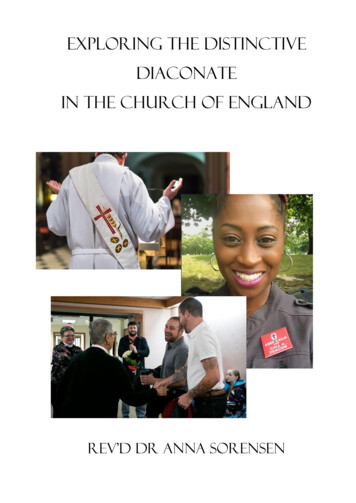
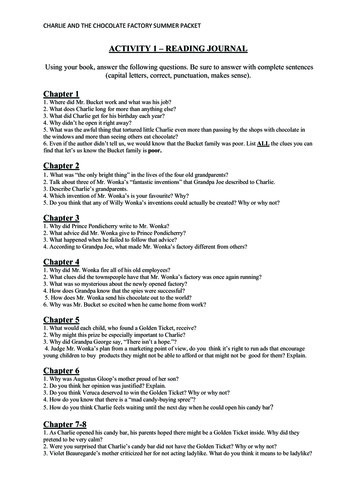
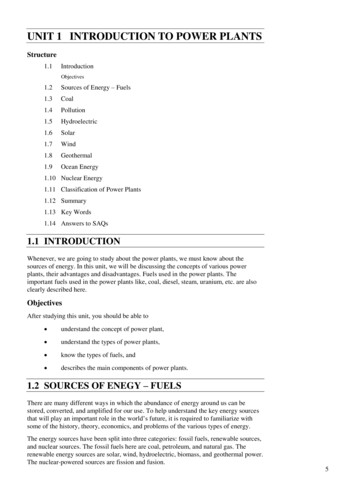

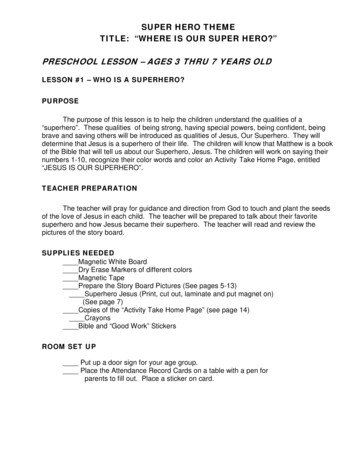
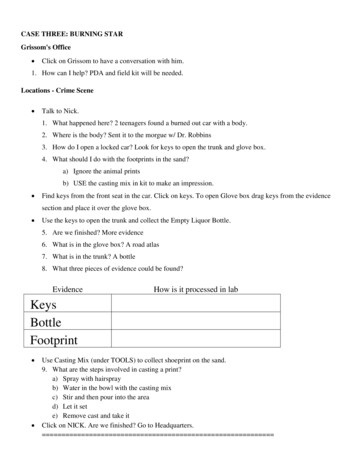
![[Page 1 – front cover] [Show cover CLEAN GET- AWAY 978-1 .](/img/13/9781984892973-6648.jpg)
